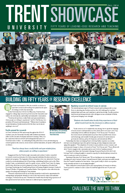
 |
 DeFactoA Glimpse into the Latest Findings at TrentDr. Fly I Presume? What’s in a name? A lot, especially when you have a fly named after you. And if you are a researcher in the field of entomology, there may be no greater honour. Recently, Trent Biology professor Dr. David Beresford experienced this honour first-hand when a former student, Trevor Burt ‘08, discovered a new species of fly and named it after his former professor. “Dr. Beresford was very influential in my training as an entomologist during my undergraduate degree, guiding my thesis work and several reading courses,” Mr. Burt said. “He was also instrumental in my efforts to gain entry to a master’s program at Carleton University.” After receiving his Bachelor of Science degree in Biology from Trent in 2012, Mr. Burt joined the Along with Dr. Skevington and Dr. Dawson, Mr. Burt published the discovery of the new species from the southern United States, Stylogaster beresfordi, in the scientific journal The Canadian Entomologist in July 2014. From the Mouths of Babes The key to the secrets of numbers and language may rest with a group of preschoolers. And, together with her project team, Dr. Nancie Im-Bolter, associate professor of Psychology at Trent University Durham, is taking it upon herself to find out more. Professor Im-Bolter says the results of a longitudinal study of three-year-olds, funded by a new Social Sciences and Humanities Research Council of Canada (SSHRC) Insight Grant and involving faculty and students from Trent, Ryerson and U of T, will likely challenge the way we think about early learning. Preschoolers will enter the study at 36 months of age and be evaluated every four months until they turn four, once at age five, and again at age six. They will be evaluated on tasks related to language, numeracy and executive function. Many of these tasks will feel like games for the children and include puppets, puzzles, toys and trinkets. The goal of the study is to identify the skills that are critical for language and math success, and to support improved educational assessment and intervention for children at risk for learning difficulties. 2+2 = Success Just about every school-aged person has probably asked themselves: “Will I ever really need math in real life?” New studies are answering with a resounding “Yes!” and are showing that math is, in fact, the best early predictor of student success. One Trent professor is taking this lesson to heart, making it her mission to help teachers better understand how children learn mathematics, not only preparing them to teach the subject, but also really enjoy it, and pass that enjoyment and success on to their students. Dr. Cathy Bruce, a founding member of Trent’s School of Education & Professional Learning, knows there is a gap in research around mathematics education in early childhood, but it’s a gap she is keen to fill. Thanks to a recent grant from the Social Sciences and Humanities Research Council of Canada (SSHRC), which will allow her to conduct much-needed research into the development of children’s spatial reasoning and its role in mathematics learning, achieving that goal is now closer than ever. We Are What We Eat Dr. Mehdi Sharifi is encouraging his students to get their hands dirty – literally and figuratively. Digging into the soil of Trent’s groundbreaking Sustainable Agriculture Experimental Farm, Professor Sharifi and his students are taking learning to a whole new level with experiential education and hands-on research opportunities. With funding provided by the Natural Sciences and Engineering Research Council of Canada (NSERC), Prof. Sharifi and his students are growing two varieties of quinoa on one acre of the farm, a 33-acre living laboratory located right on Trent’s Symons Campus. Quinoa is a relatively new crop in Ontario and is celebrated for its high nutritional value and for being gluten free. Prof. Sharifi, the Canada research chair in sustainable agriculture and a professor in Trent’s new Sustainable Agriculture and Food Systems program, hopes the project will create more sustainable ways of growing quinoa as a means to produce organic food for local cafes and to teach his students to think differently about the food we eat. “Most conventional agriculture educational programs focus on larger-scale food production, but fail to address the crucial role of small-scale diversified farming in the world’s food system. The social, political and environmental sustainability of our food system needs to be highlighted,” he said. |
































